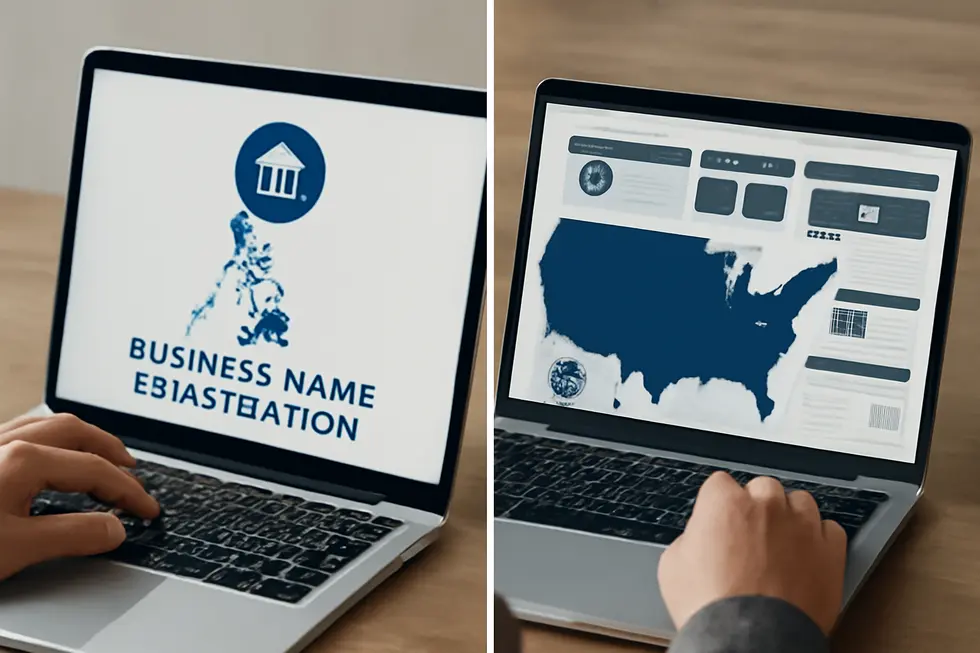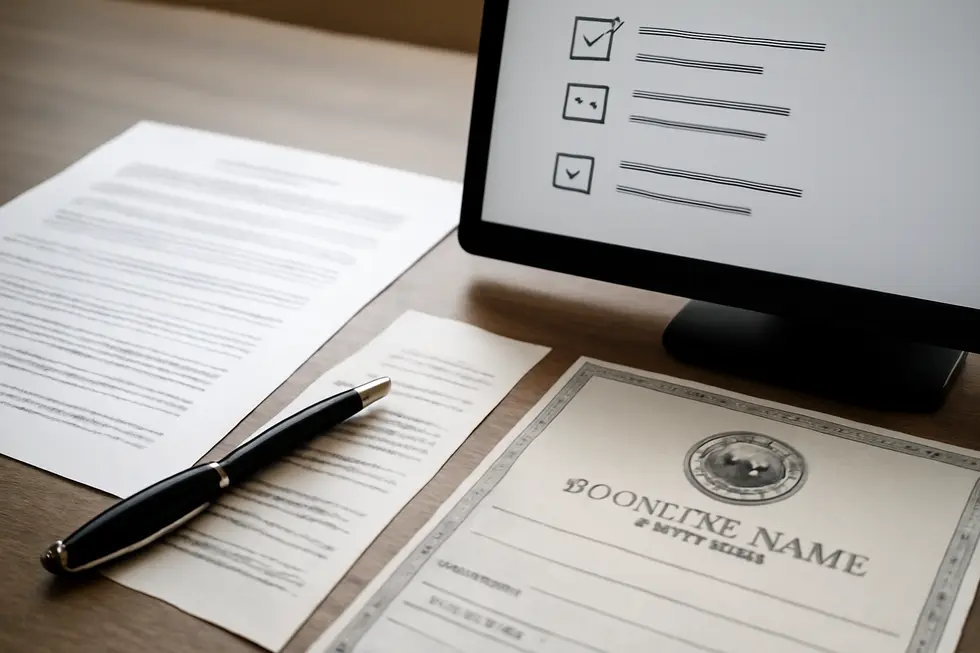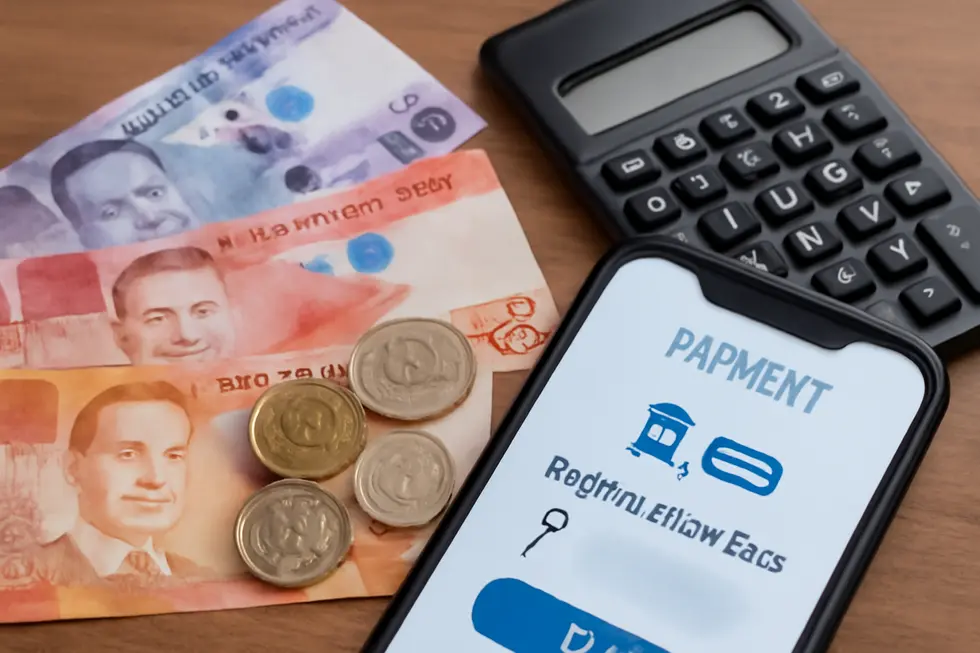Introduction
Registering your business name with the Department of Trade and Industry (DTI) is a critical step for entrepreneurs and business owners in the Philippines to secure legal recognition and protect their brand identity. Whether you are launching a startup or expanding an existing enterprise, understanding how the DTI registration works can offer clarity, streamline your operations, and ensure legal compliance. This comprehensive guide breaks down the entire business name registration process with the DTI, differentiates it from U.S. state-level registration systems, and highlights the legal and financial requirements involved. You will also learn how the DTI system protects your business name, why it matters for brand security, and how to leverage online platforms to simplify registration. Each chapter provides actionable insights designed to support your business journey from the initial name search to obtaining your official certificate.
Tables of Contents
Chapter 1: Department of Trade and Industry Business Name Registration Process in the Philippines
- Navigating Eligibility and Online Name Registration Through the DTI Portal
- Navigating Local Permits and Tax Registration After DTI Business Name Registration
Chapter 2: Department of Trade and Industry Business Name Registration vs. U.S. State-Level Processes
- Navigating Centralized Registration in the Philippines and Decentralized State Systems in the U.S.
- A Clear Contrast: Procedural Steps, Fees, and Compliance in DTI Versus U.S. State Business Name Registration
Chapter 3: Legal and Technical Requirements for Department of Trade and Industry Business Name Registration
- Navigating the Legal Foundations and Compliance Essentials of DTI Business Name Registration
- Navigating the Technical Steps and Essential Documentation in DTI Business Name Registration
Chapter 4: Understanding the Fees and Costs of Business Name Registration with the Department of Trade and Industry
- Decoding the Registration Fee Structure and Cost Variations for DTI Business Name Registration
- Navigating Additional Charges and Renewal Fees for DTI Business Name Registration
Chapter 5: Department of Trade and Industry Business Name Registration for Protecting Brand Identity and Legal Recognition
- Securing Unique Business Identities and Legal Foundations through DTI Registration
- Strengthening Brand Protection: Aligning DTI Business Name Registration with Trademark Law for Legal Security
Chapter 6: Online Platforms and Digital Services for Department of Trade and Industry Business Name Registration
- Revolutionizing Business Name Registration: The Digital Backbone of the DTI’s Online Services
- The Economic and Societal Transformations Driven by Digital Business Name Registration in the DTI
Chapter 1: Department of Trade and Industry Business Name Registration Process in the Philippines

1. Navigating Eligibility and Online Name Registration Through the DTI Portal
Registering a business name with the Department of Trade and Industry (DTI) in the Philippines begins with meeting basic eligibility requirements. Applicants must be Filipino citizens or foreign nationals permitted by law, with the latter restricted if their business is listed on the Foreign Investment Negative List. Moreover, registrants must be at least 18 years old and possess valid identification and necessary permits. This ensures that only legitimate individuals and entities can secure exclusive rights to use their chosen business names.
Choosing a distinctive business name is a pivotal step in the registration process. Entrepreneurs can opt to register their personal name or devise a unique trade name that reflects their brand identity. The DTI mandates a name availability check through its Business Name Registration System (BNRS) online portal to prevent duplication and conflicts with existing businesses. After registration, the business name is valid for an initial five-year term and can be renewed for consecutive periods to maintain exclusivity.
The entire registration process is streamlined for convenience through the DTI’s fully digital BNRS portal. Applicants complete the submission online by providing required details and supporting documents. The registration fees vary between Php 500 and Php 2,000 depending on whether the business operates regionally, provincially, or nationally. Upon payment and verification, the DTI issues an official Business Name Registration Certificate, typically sent via email in PDF format. This certificate is essential for subsequent steps such as securing local permits and tax registrations.
To operate legally, it is imperative that registered businesses maintain a valid registered address compliant with local zoning laws, as this serves as the official point of contact for permits and government correspondence. For a comprehensive guide and to initiate registration, entrepreneurs can visit the official DTI portal at https://bnrs.dti.gov.ph/registration.
For further details on protecting your business identity, consider reviewing important practices in trademark protection for business names and logos.
2. Navigating Local Permits and Tax Registration After DTI Business Name Registration
Registering a business name with the Department of Trade and Industry (DTI) in the Philippines marks only the initial step toward legally operating a business. Following name registration, entrepreneurs must secure essential local permits and fulfill tax obligations to ensure compliance with national and local regulations.
First, obtaining local permits is crucial. Businesses must register with the Barangay where they operate to receive a Barangay Clearance, certifying that they comply with community-level regulations. Subsequently, securing a Mayor’s Permit or Business Permit from the City or Municipal Hall is mandatory. This permit affirms the business’s authorization to operate within the local government unit (LGU) and involves adherence to local ordinances on taxes, safety, health, and environmental standards. These permits apply to all business forms, ensuring a unified framework across sole proprietorships, partnerships, corporations, and cooperatives.
Simultaneously, tax compliance begins with registering the business with the Bureau of Internal Revenue (BIR). Submission of BIR Form 1901, together with the DTI Certificate, local permits, valid identification, and payment of a documentary stamp tax, results in the issuance of a Certificate of Registration (Form 2303) and a Taxpayer Identification Number (TIN). Businesses are required to issue BIR-compliant invoicing, maintain proper books of accounts, and file tax returns on a regular monthly, quarterly, and annual schedule. Reporting updates such as changes in business address or closure to both local authorities and the BIR is also essential.
A registered business address underpins both DTI business name registration and the subsequent permits, affirming legitimacy and accountability. Foreign investors face additional registration with the Securities and Exchange Commission (SEC) and may encounter ownership restrictions.
For a detailed guide on compliance after registering your business name with the DTI, consult the DTI official online registration portal. This resource supports entrepreneurs in successfully navigating the full spectrum of requirements necessary to launch and maintain a business in the Philippine legal landscape.
Chapter 2: Department of Trade and Industry Business Name Registration vs. U.S. State-Level Processes

1. Navigating Centralized Registration in the Philippines and Decentralized State Systems in the U.S.
The business name registration system in the Philippines stands out for its centralized approach, managed exclusively by the Department of Trade and Industry (DTI). This national framework simplifies the process by providing a single authoritative body responsible for verifying business name availability, processing registrations, and protecting registered names. Entrepreneurs benefit from uniform rules and a consistent procedure regardless of location within the country, making it easier to establish legal identity and brand protection nationwide. Through the DTI’s digital portal, applicants can complete registration entirely online, pay standardized fees, and receive certification recognized across the Philippines. In contrast, the United States features a decentralized model where business name registration is governed by individual states. Each state’s Secretary of State or a similar office administers its own registration requirements, fees, and deadlines. Entrepreneurs must conduct name searches within each state they plan to operate, file separate registrations—including fictitious or Doing Business As (DBA) filings—and comply with state-specific regulations. For example, Pennsylvania mandates a registration fee of $70 and requires submitting a distinct form for assumed business names. Additionally, U.S. businesses must secure a federal Employer Identification Number (EIN) for tax purposes, an entirely separate procedure from state registration. This fragmented framework offers regulatory flexibility tailored to local economies but also demands that business owners navigate varying rules and increased administrative workload. While the Philippines’ centralized system ensures straightforward nationwide compliance and brand exclusivity, the U.S. state-level system reflects a federalist governance style that emphasizes local control and customization. Understanding these fundamental differences is essential for entrepreneurs operating across borders or comparing registration strategies. For more on protecting your business identity, explore insights on business name protection. Philippine entrepreneurs can access official registration details at the DTI online services portal: https://www.dti.gov.ph/dti-online-services.
2. A Clear Contrast: Procedural Steps, Fees, and Compliance in DTI Versus U.S. State Business Name Registration
Business name registration procedures in the Philippines and the United States reveal significant differences shaped by their respective legal and administrative structures. In the Philippines, the Department of Trade and Industry (DTI) operates as a centralized national agency primarily serving sole proprietors. Entrepreneurs submit applications online or in person through DTI’s streamlined system, which ensures a nationwide name uniqueness check. This single-step registration focuses exclusively on business names under sole proprietorship, without requiring concurrent business structure registration. Fees are modest and standardized, varying by business scope and registration period, making the process accessible and cost-effective.
Conversely, U.S. business name registration occurs at the state level, with each state administering its own regulations through Secretary of State offices or equivalents. Here, entrepreneurs must search for name availability within the specific state and file appropriate forms online or by mail. The process is more complex due to multiple business entity types—LLCs, corporations, sole proprietorships—each demanding separate registration and compliance. Additionally, if operating under an alternative name, a Doing Business As (DBA) filing is generally required. Fees fluctuate widely among states, often exceeding the Philippine standard, and additional costs apply for expedited processing or registering the legal entity itself.
Compliance also differs: DTI registrations require periodic renewal and separate local permits, while U.S. businesses must adhere to state-mandated ongoing reporting, tax notifications, and naming conventions reflecting the business structure (e.g., LLC or Inc.). Federal protections such as trademark registration remain a separate layer in both countries but are notably distinct from the business registration process. This contrast underscores how centralized simplicity in the Philippine DTI system caters to sole proprietors, whereas the highly decentralized U.S. framework demands more extensive navigation across business types and state-specific rules.
For a deeper understanding of protecting your business identity beyond registration, consider exploring trademark protection fundamentals. Philippine entrepreneurs can access the official DTI portal for comprehensive registration guidance at https://www.dti.gov.ph/dti-online-services.
Chapter 3: Legal and Technical Requirements for Department of Trade and Industry Business Name Registration

1. Navigating the Legal Foundations and Compliance Essentials of DTI Business Name Registration
Registering a business name with the Department of Trade and Industry (DTI) involves a rigorous legal framework designed to safeguard both business owners and consumers. Central to this framework is the requirement that a business name be unique and free from any resemblance to existing trademarks or registered names, thereby preventing infringement and market confusion. Prospective registrants must present valid identification and proof of eligibility, confirming their lawful authority to operate the business under the chosen name.
A thorough name search is a mandatory step, ensuring the proposed business name is available and compliant with DTI regulations. In some cases, name reservation can secure a business name prior to formal registration. The process requires completing the mandated forms via the DTI’s online portal and remitting the prescribed registration fees to finalize the legal recognition.
Moreover, compliance extends beyond submission of paperwork; it requires alignment with applicable local laws concerning geographic scope and industry-specific restrictions. The selected business structure—whether sole proprietorship, partnership, or corporation—must also be reflected accurately in registration documents. For enhanced protection, businesses often consider securing trademarks, which involve a distinct process through the Intellectual Property Office to establish exclusive rights nationwide.
Additionally, ensuring consistency of the business name across digital platforms, such as domain registrations and social media handles, reinforces brand identity and reduces the risk of unauthorized use. This combination of legal safeguards and technical compliance not only legitimizes the business but also fortifies its market presence.
For entrepreneurs seeking detailed guidance on legal compliance and registration steps within the Philippine context, the DTI’s official resource provides comprehensive instructions. More insights on protecting your business name and brand can be explored through expert discussions on trademark protection for business names.
External reference: https://www.dti.gov.ph/dti-online-services
2. Navigating the Technical Steps and Essential Documentation in DTI Business Name Registration
Registering a business name with the Department of Trade and Industry (DTI) in the Philippines requires precise execution of several technical steps paired with the submission of essential documentation. The process begins with a critical verification of the chosen business name’s availability through the DTI Business Name Registration System (BNRS), ensuring it is unique and does not conflict with existing registered names or trademarks. This step safeguards the exclusivity of your brand within the market.
Eligibility criteria, such as citizenship and age, must be confirmed before proceeding. Applicants then prepare necessary documents which typically include two valid government-issued IDs, proof of address, and may extend to local government permits like Barangay Clearance and Mayor’s Permit. These documents prove the legitimacy and residency of the registrant, aligning with regulatory requirements.
Submission can be completed online or in person, depending on the registrant’s preference and local capabilities. Upon successful registration, the DTI issues a Business Name Registration Certificate valid for five years, a fundamental legal document crucial for opening bank accounts, processing permits, and registering for taxes.
Post-registration, entrepreneurs must secure a Tax Identification Number (TIN) from the Bureau of Internal Revenue (BIR) and comply with accounting and local permit requirements to fully legitimize their business operations.
Parallel processes in other jurisdictions, like the United States, emphasize a name search, filing specific forms, and fee payment, although they operate under decentralized frameworks with varied fee structures and naming conventions. For example, state-specific requirements such as the inclusion of legal entity suffixes and separate DBA filings differentiate the U.S. approach from the Philippines’ centralized system.
This structured, clear procedural framework ensures that business owners meet both legal standards and technical protocols essential to secure their enterprise’s identity and operate compliantly.
For additional insight, entrepreneurs can learn more about the detailed procedural and documentary requirements for sole proprietorships in the Philippines at Deel on Sole Proprietorship Philippines.
Chapter 4: Understanding the Fees and Costs of Business Name Registration with the Department of Trade and Industry

1. Decoding the Registration Fee Structure and Cost Variations for DTI Business Name Registration
The fee structure for registering a business name with the Department of Trade and Industry (DTI) in the Philippines is straightforward but can vary based on certain specifics. Typically, the standard registration fee for a sole proprietorship’s business name is around PHP 200. This base fee covers the processing of the application and the issuance of the official certificate, which is essential for legal recognition and operational legitimacy. However, the overall costs may fluctuate depending on several factors such as the business type, duration of registration, and any additional services requested, including expedited processing.
While the PHP 200 fee applies broadly to most sole proprietorship registrations, other business structures like partnerships or corporations may encounter different cost brackets, though these are often managed outside the DTI’s sole proprietorship registration process. Moreover, some registrants may opt for multi-year registration validity, which affects total fees accordingly. Additional certifications or services requested during registration can further increase the fees, making it important for applicants to clarify all potential charges upfront.
In contrast, business name registration fees in other countries, like the United States, illustrate a broader variation in cost due to the decentralized state-by-state process. U.S. state fees typically range from $50 to over $1,500 depending on local regulations and the business entity type. For example, registering a fictitious business name (Doing Business As) in Pennsylvania costs approximately $70. Further, trademark registration with federal agencies such as the USPTO involves separate fees, standardized at $350 per class starting 2025.
Understanding these differences highlights the efficient and centralized approach the DTI offers in the Philippines, making business name registration more accessible and cost-transparent. For entrepreneurs seeking further details on registration fees and procedures, consulting the official DTI online services portal is recommended. Additionally, exploring topics related to trademark protection for business names and logos can provide valuable insight into brand security after registration.
External resource for official fees: https://www.dti.gov.ph/dti-online-services
2. Navigating Additional Charges and Renewal Fees for DTI Business Name Registration
The Department of Trade and Industry (DTI) in the Philippines imposes specific fees beyond the initial business name registration to maintain accurate and up-to-date records. These consist primarily of additional fees for amendments and renewal fees, which are crucial for the continued legal recognition of a business name.
Additional fees apply when an entrepreneur requests changes to their registered information, such as updating the business address, modifying ownership details, or altering the type of business activity. These fees tend to be lower than initial registration charges, reflecting the administrative costs of processing amendments. However, fee amounts vary based on the specific change requested and the territorial scope of the registration.
The validity of a DTI business name registration spans five years, after which a renewal is mandatory to extend the registration for another five-year term. Renewal fees generally mirror the original registration cost, scaled by the geographical coverage from barangay to national level. Keeping a business name registration current by paying renewal fees ensures continuous legal protection and compliance with DTI regulations.
Additional documentation fees may also arise, such as charges for obtaining certified true copies of registration certificates or other official papers. While exact amounts for these fees fluctuate and are subject to periodic revision, the fee structure is designed to facilitate accessibility while supporting the regulation and integrity of business identity.
For entrepreneurs seeking the most accurate and updated fee details, the official DTI online registration portal remains the primary and authoritative source. For further context on protecting your business brand and understanding related intellectual property concerns, exploring information on trademark protection can be invaluable. Detailed guidance for DTI registration can be found at DTI Online Services.
Chapter 5: Department of Trade and Industry Business Name Registration for Protecting Brand Identity and Legal Recognition

1. Securing Unique Business Identities and Legal Foundations through DTI Registration
Registering a business name with the Department of Trade and Industry (DTI) is a critical step in establishing a unique and legally recognized identity for Filipino enterprises. This registration safeguards brand identity by ensuring the selected business name is not already in use, thus preventing consumer confusion and minimizing the risk of legal disputes over name infringement. The DTI requires a thorough name search during registration to confirm exclusivity, which serves as a protective barrier against unauthorized use within the local or national market.
Beyond establishing uniqueness, DTI business name registration grants formal legal recognition. This allows businesses to operate legitimately, open bank accounts, and meet tax and regulatory obligations. The issued certificate of registration acts as an essential legal document that supports business activities and government transactions. It also lays the groundwork for enforcing rights associated with the business name, enabling entrepreneurs to build a credible reputation in the industry.
While DTI registration is indispensable in forming the legal foundation of a business’s identity, it does not extend comprehensive nationwide protection or confer exclusive rights beyond its scope. For more robust brand protection, especially on a larger scale, businesses should complement DTI registration with federal trademark registration. This federal protection enables exclusive use of the name nationwide, affording stronger legal safeguards against similar or conflicting names.
Ultimately, DTI business name registration plays a foundational role in protecting brand identity and securing legal recognition, making it a vital first step for any Filipino business aiming to operate with legitimacy and safeguard its unique presence. For further information on securing business name rights and trademark protections, additional resources can be explored via trademark name and logo protection.
More details on the online registration process are available on the official DTI portal: https://www.dti.gov.ph/dti-online-services
2. Strengthening Brand Protection: Aligning DTI Business Name Registration with Trademark Law for Legal Security
Registering a business name with the Department of Trade and Industry (DTI) in the Philippines provides entrepreneurs the essential legal recognition to operate under a unique name locally. This process prevents identical business names within a jurisdiction, ensuring clarity in commerce and fostering a lawful business environment. However, business name registration alone does not grant comprehensive protection for a brand’s identity. It does not stop others from using similar or confusingly close names in different areas or industries, nor does it convey exclusive rights over the name as a source identifier.
Trademark registration addresses these gaps by offering robust, nationwide, and even international protections for distinctive marks, including names, logos, slogans, and other brand identifiers. Once registered with the intellectual property office, trademarks confer exclusive rights to use these marks on specified goods or services. This exclusivity aids in preventing unauthorized use, dilution, or cybersquatting, and grants a legal presumption of ownership, making enforcement through specialized federal courts more streamlined and effective.
To fully safeguard a business’s brand identity, integrating both DTI business name registration and trademark registration is prudent. While the DTI certifies a name’s validity for local operation, trademark registration defends the brand against infringers across broader markets. Conducting thorough availability and conflict searches before applying helps avoid costly disputes. Early trademark registration complements the DTI registration by securing enforceable rights and protecting the company’s reputation in the long term.
This dual approach forms a comprehensive legal shield enabling businesses not only to operate legitimately but also to preserve their distinctiveness in an increasingly competitive marketplace. Entrepreneurs are encouraged to familiarize themselves with trademark procedures alongside DTI processes to build stronger brand security. For further insights, explore comprehensive guides on trademark protection for business names and logos.
Chapter 6: Online Platforms and Digital Services for Department of Trade and Industry Business Name Registration

1. Revolutionizing Business Name Registration: The Digital Backbone of the DTI’s Online Services
The Department of Trade and Industry (DTI) in the Philippines has dramatically transformed business name registration through its sophisticated digital platform. Central to this innovation is the comprehensive Business Name Registration System (BNRS), which allows entrepreneurs to submit applications, monitor progress, and renew registrations entirely online. This seamless digitization eliminates the need for physical visits, reducing administrative delays and lowering barriers for small business owners.
The system’s intuitive interface supports real-time name availability checks, helping applicants choose distinctive and compliant business names critical for building a protected brand identity. Integrated payment gateways enable convenient fee transactions, while post-registration management features streamline updates and corrections without tedious paperwork. These advancements cater primarily to sole proprietorships, ensuring that business registration, certification, and renewal processes are efficient and user-friendly.
Moreover, the DTI platform synergizes with other government digital services, including SME training programs, cooperative registrations, and intellectual property applications. This interconnected digital ecosystem fosters a supportive environment for entrepreneurs, facilitating compliance and broadening their access to governmental resources. This integration reflects a national effort to embrace digital transformation by improving regulatory processes and enhancing accessibility for business stakeholders, particularly in the expanding online commerce sector.
For entrepreneurs seeking detailed guidelines or to initiate online registration, the official DTI portal offers comprehensive resources and direct access to the BNRS at https://www.dti.gov.ph/dti-online-services. This centralized digital approach contrasts dramatically with decentralized systems elsewhere, underscoring the Philippines’ commitment to leveraging technology in business facilitation.
For more insight on protecting your business identity online, consider exploring trademark protection strategies.
2. The Economic and Societal Transformations Driven by Digital Business Name Registration in the DTI
The introduction of online platforms and digital services for Department of Trade and Industry (DTI) business name registration has transformed how entrepreneurs engage with the regulatory environment. By streamlining registration processes, these digital tools reduce entry barriers, allowing a greater number of businesses to formalize operations quickly and securely. This formalization brings widespread economic benefits, such as increased customer confidence due to legal recognition, protection of brand identity, and enhanced access to financing and contract opportunities essential for business growth. Registered entities can leverage broadened market reach beyond local communities, fostering a competitive environment that drives innovation and price efficiency.
Beyond economics, digital registration promotes societal inclusivity by expanding opportunities for underrepresented and marginalized groups. By making the registration process accessible online, digital platforms help small and disadvantaged entrepreneurs enter the formal economy and compete on more equal footing. Regulatory frameworks accompanying these platforms aim to maintain fair competition, protecting smaller players from monopolistic pressures by large multinational corporations.
Consumers also benefit through an expanded choice of goods and services, often at more competitive prices due to increased market dynamism. The cooperative governance models supporting these digital services ensure that public interest remains prioritized, consumer rights are protected, and trust is sustained in the digital marketplace’s integrity.
Moreover, digital registration functions as a gateway to resources such as funding, networking, and official certifications, vital for sustainable economic development. Business owners seeking legal protections for their brands may also explore related intellectual property considerations, which can be key to long-term success as discussed in resources like trademark2go.com/copyright-business-name-protection.
For further insight into the regulatory and competitive landscapes shaped by these innovations, the Digital Regulation Platform offers an extensive analysis of digital competition and collaborative governance models at https://digitalregulation.org/collaborative-governance/.
Final thoughts
Successfully registering your business name with the Department of Trade and Industry offers Philippine entrepreneurs a streamlined, legal, and secure way to establish and protect their brand identities. The centralized and digital nature of the DTI registration process stands in clear contrast to state-based systems like those in the U.S., making it more accessible and straightforward for entrepreneurs in the Philippines. Understanding the legal and technical requirements ensures compliance, while awareness of fees and costs helps in planning your business budget effectively. Importantly, securing your business name through DTI registration not only grants you legal recognition but also safeguards your brand from unauthorized use. Utilizing the available online platforms further simplifies this essential process, enabling you to focus on growing your business with confidence and legitimacy. Taking these well-informed steps solidifies the foundation for a successful business journey in the Philippine market.
Your IP is the foundation of your success – let’s protect it together before it’s too late. We can’t wait to help you turn your ideas into legally secured assets.
About us
undefined


